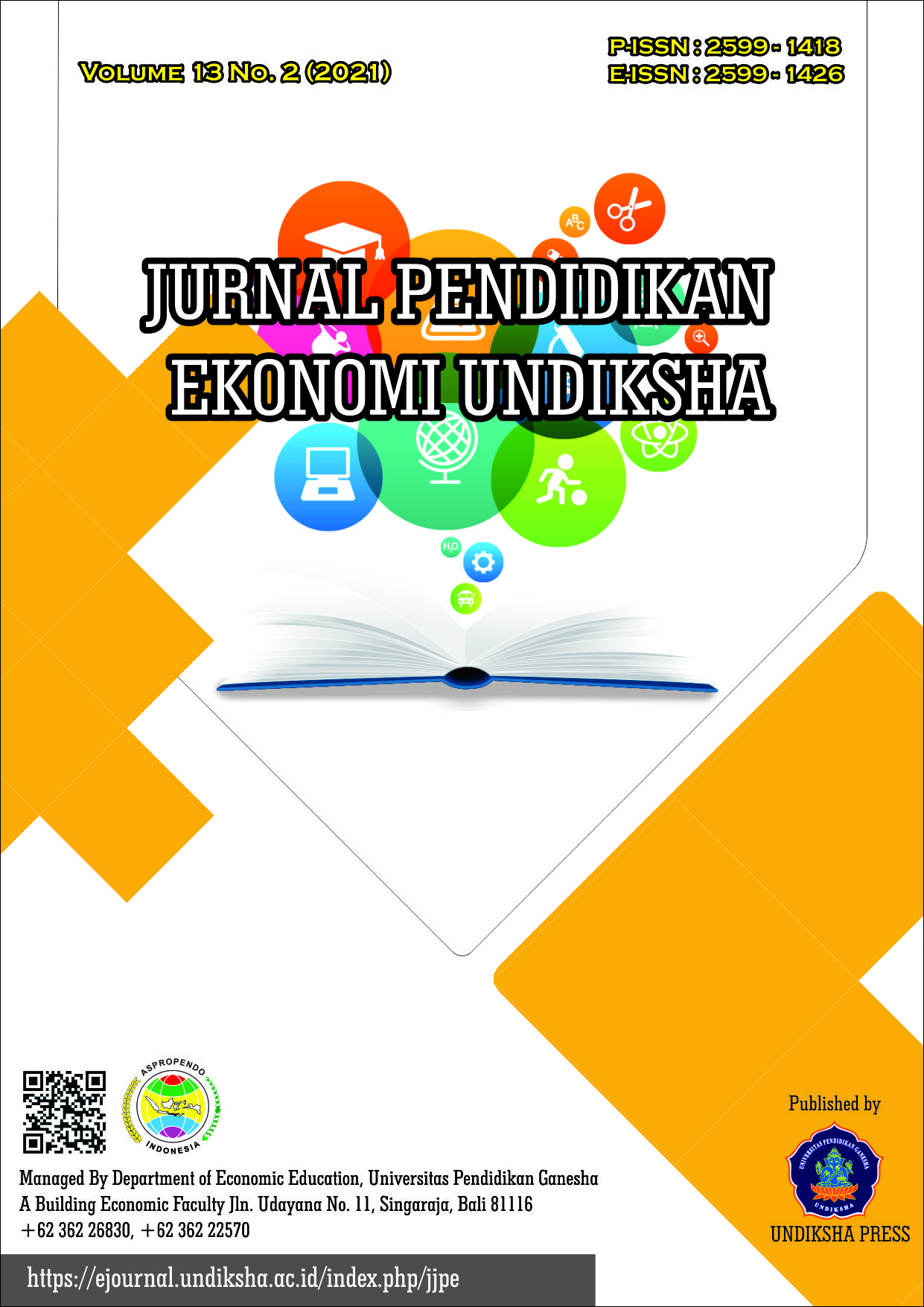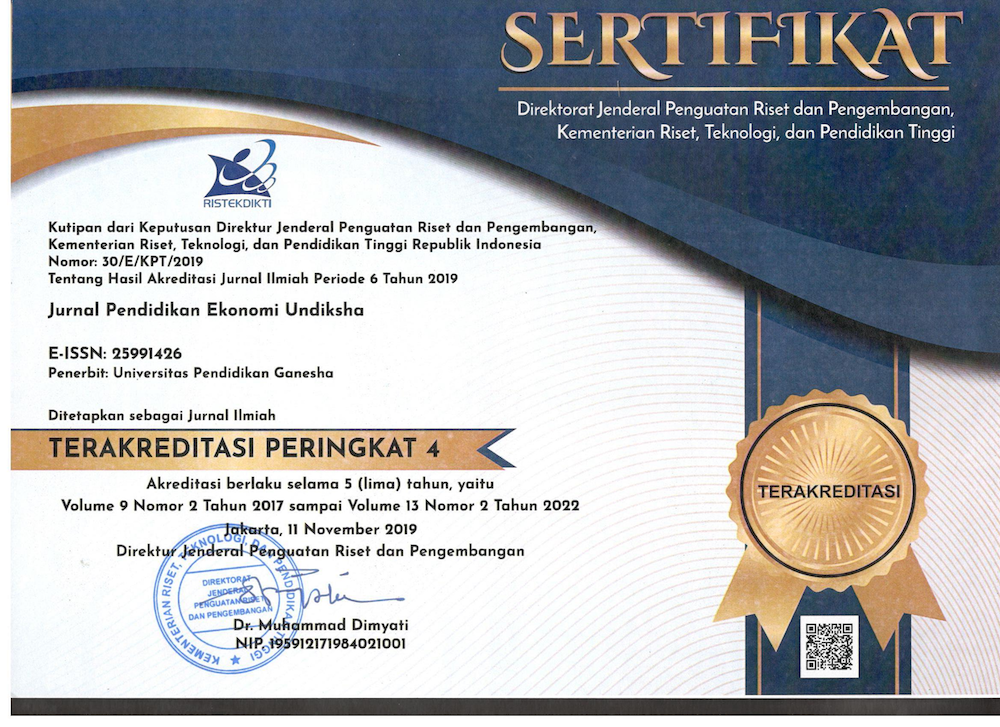Pengaruh Kinerja Baznas Terhadap Kesejahteraan Masyarakat di Indonesia Tahun 2001-2020
DOI:
https://doi.org/10.23887/jjpe.v13i2.40801Keywords:
Baznas, IPM, KinerjaAbstract
This study aims to examine the performance of the National Amil Zakat Agency (BAZNAS) which is an institution that manages zakat funds for the welfare of the people in Indonesia. Performance measurement by calculating the ratio of fiscal performance, public support, and efficiency of fundraising. In addition, people's welfare by looking at the Human Development Index (IPM). The research method used is descriptive quantitative with secondary data types, namely BAZNAS financial statements and HDI figures with an observation period from 2001 to 2020. The data analysis technique uses multiple linear regression with statistical evaluation tools 12. The results show that fiscal performance, public support, and efficiency fundraising do not partially affect the welfare of the people in Indonesia. Furthermore, the simultaneous test shows that the performance of BAZNAS which consists of fiscal performance, public support, and efficiency funding does not simultaneously affect the welfare of the people in Indonesia.References
Achiria, D. R. dan S. (2018). Implementasi Keadilan dalam Pembangunan Ekonomi Islam. 2015, 53–68.
Arwani, A., & Wahdati, A. (2020). The Effect of Zakat, Infak, Sedekah (ZIS), Human Development Index and Unemployment on Indonesia’s Economic Growth. 5(2), 159–173. https://doi.org/10.21093/at.v5i2.2220
Ayu, D., Cahya, N., & Achmad, T. (2017). Analisis pengaruh reputasi organisasi dan kinerja keuangan terhadap kontribusi organisasi nirlaba. Diponegoro Journal of Accounting, 6(3), 606–614.
Azwari, P. C., Rijal, K., Safitri, N., & Saputra, R. (2019). The Financial Performance Measurement Model Modification Using Tools of Ritchi Kolodinsky and International Zakat Standard of Management (ISZM). International Conference of Zakat, 137–159. https://doi.org/10.37706/iconz.2019.149
Badan Pusat Statistik. (2020). Indeks Pembangunan Manusia. In Indeks Pembangunan Manusia.
Bahri, E. S., Romantin, M., & Lubis, A. T. (2017). Analisis Kinerja Keuangan Lembaga Zakat (Studi Kasus : Badan Amil Zakat Nasional). Perisai : Islamic Banking and Finance Journal, 1(2), 96–116. https://doi.org/10.21070/perisai.v1i2.882
BAZNAS. (2020). Fikih SDGs.pdf.
Beik, S. I. (2009). Analisis Peran Zakat dalam Mengurangi Kemiskinan : Studi Kasus Dompet Dhuafa Republika. Jurnal Pemikiran Dan Gagasan.
Djuwarijah, D. (2008). Peningkatan Kualitas Sumber Daya Manusia Melalui Pendidikan Islam. El-Tarbawi, 1(1), 13–26. https://doi.org/10.20885/tarbawi.vol1.iss1.art2
Ezza, A. I., S, D. H., & Setiawan. (2018). Penurunan Persentase Kemiskinan Sebagai Dampak Kinerja Keuangan Organisasi Pengelola Zakat di Indonesia. … Research Workshop and …, May 2019.
Haron, M. S., & Rahman, R. (2016). Pengagihan Zakat Dalam Konteks Kesejahteraan Masyarakat Islam: Satu Tinjauan Berasaskan Maqasid Al-Syari’Ah. Labuan E-Journal of Muamalat and Society, 10, 129–140.
Kahf, M. (1999). The performance of the institution of zakah in theory and practice. International Conference on Islamic Economics Towards the 21st Century, 1–40.
Khasandy, E. A., & Badrudin, R. (2019). The Influence of Zakat on Economic Growth and Welfare Society in Indonesia. Integrated Journal of Business and Economics, 3(1), 65. https://doi.org/10.33019/ijbe.v3i1.89
Lazuardy, A., Sarumpaet, S., & Sukmasari, D. (2017). An Evaluation of Indonesian Environmental Non-profit Organisations’ Financial Performance (An Empirical Study on World Wildlife Fund Indonesia).
Murniati, R., & Beik, I. S. (2014). Pengaruh Zakat terhadap Indeks Pembangunan Manusia dan Tingkat Kemiskinan Mustahik: Studi Kasus Pendayagunaan BAZNAS Kota Bogor. Al-Muzara’ah, 2(2), 135–149. https://doi.org/10.29244/jam.2.2.135-149
Ningrum, J. W., Khairunnisa, A. H., & Huda, N. (2020). Pengaruh Kemiskinan, Tingkat Pengangguran, Pertumbuhan Ekonomi dan Pengeluaran Pemerintah Terhadap Indeks Pembangunan Manusia (IPM) di Indonesia Tahun 2014-2018 dalam Perspektif Islam. Jurnal Ilmiah Ekonomi Islam, 6(2), 212. https://doi.org/10.29040/jiei.v6i2.1034
Nurbismi, N., Maulida, Z., Ridha, A., & Astuti, I. N. (2019). Peranan Kinerja Amil Mengelola Zakat Produktif Dalam Mengentaskan Kemiskinan Di Kota Banda Aceh. Jurnal Samudra Ekonomi Dan Bisnis, 10(2), 156–167. https://doi.org/10.33059/jseb.v10i02.1322
Nurzaman, S. M. (2011). Zakat and Human Development : An Empirical Analysis on Poverty Alleviation in Jakarta , Indonesia 1. 8th International Conference on Islamic Economics and Fnance, 1–26.
Nurzaman, S. M. (2017). The impact of Zakat Programs From Human Development Perspectives: An Empirical Evaluation. Dental Nursing, 13(5), 232–233. https://doi.org/10.12968/denn.2017.13.5.232
Prihastuti, A. H. (2018). Pengaruh Alokasi Belanja Modal Dan Pertumbuhan Ekonomi terhadap Indeks Pembangunan Manusia di Kabupaten/Kota Riau. Jurnal Menara Ekonomi, 4(1), 1–8.
Purbaningsih, Y. P. (2021). The effect of income distribution, human development index, and economic growth on poverty. International Journal of Economic and Business Applied, 1(2), 187–194.
Ritchie, W. J., & Kolodinsky, R. W. (2003). Nonprofit organization financial performance measurement: An evaluation of new and existing financial performance measures. Nonprofit Management and Leadership, 13(4), 367–381. https://doi.org/10.1002/nml.5
Sakeenah Anuar, F., Mohd Alwi, N., & Ariffin, N. M. (2019). Financial Management Practices and Performance of Zakat Institutions in Malaysia. Financial Management Practices and Performance of Zakat Institutions in Malaysia IPN Journal of Research and Practice in Public Sector Accounting and Management, 9(1), 1–26.
Sanders, K. (2008). An Analysis Of Florida Public Community College Foundations’ Performance Measures From 2002-2004.
Sodiq, A. (2016). Konsep Kesejahteraan Dalam Islam. Equilibrium, 3(2), 380–405.
Suprayitno Eko, Mohamed Aslam, & Azhar Harun. (2017). Zakat and SDGs : Impact Zakat on Human Development in the Five States of Malaysia. International Journal of Zakat, 2(1), 61–69.
Suradi. (2007). Pembangunan manusia, kemiskinan dan kesejahteraan sosial. Jurnal Penelitian Dan Pengembangan Kesjahteraan Sosial, 12(3), 1–11.
Wahab, N. A., & Rahim, A. (2011). A framework to analyse the efficiency and governance of zakat institutions. Journal of Islamic Accounting and Business Research, 2(1), 43–62. https://doi.org/10.1108/17590811111129508
Wahab, N. A., Zainol, Z., Bakar, M. A., Ibrahim, A. Z., & Minhaj, N. (2016). Developing Service Quality Index for Zakat Institutions. International Journal of Economics and Financial Issues, 6(7S), 249–258.





